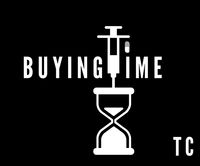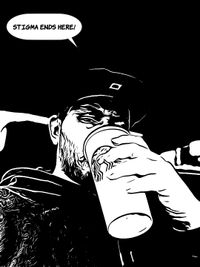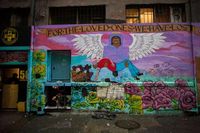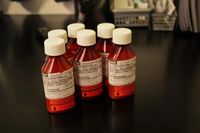I wake up like any other working day—another Tuesday morning. I shower, brush my teeth, get dressed, get 'well,' kiss my wife and son goodbye and go to work. I have a good job in the office of a production warehouse. I am a mid-level Manager and hold the second-highest job title at the facility, with most employees working under my supervision. I work as a supply chain and inventory control manager. Over five thousand employees work for the company, which operates in various regions throughout Canada. I am just one part of a bigger picture, both in my work life and as someone who uses drugs.
I'd like to think that I am a productive member of society, not only in my professional capacity but also in my personal life. Like many married couples, we have mortgage payments, bills, and other expenses and responsibilities. Unlike most people, I need more than just food, water, air and sleep to function daily. My body and mind need something else to keep going that often feels out of my control. It has not been easy. I have been using opioids every day for almost twenty years. It's not like I can just stop. Trust me, I've tried. Getting 'well' is a central part of my daily routine. In my mind, this does not mean I am 'bad’ or doing something wrong. While society and many individuals judge drug users harshly, I think I am a good person. But to keep everything going, specifically work and family, while staving off physical withdrawals, I must use fentanyl, which remains criminalized and stigmatized, and I feel forced to maintain this part of my life in a place that is hidden away: I am 'buying time.'
I'm constantly putting money and time into a parking metre, buying a twenty-four-hour pass daily, in two to four-hour increments as I use fentanyl to maintain physical and mental stability. However, the pass doesn't last twenty-four hours. I have to top up and do a line of fentanyl every two to four hours. It wasn't always like this. I started with Percocets and Oxycontin, which eventually led to heroin and now fentanyl. Some of these changes I was aware of, but when fentanyl first came around, most of us did not even know it was in our drug supply. It made things harder and more dangerous. But I have to stave off the looming withdrawals, and right now, only fentanyl does the trick.
"…if I didn't put money in the meter, my work life would fall apart quickly. And every time I load the meter, I put myself at risk in various ways."
Withdrawal sucks, and just the thought of it looming around the corner can be insufferable. Thankfully, I can keep things pretty regular and withdrawal at bay most of the time. If I do go into withdrawal, everything collapses. For example, presently I believe nobody at work suspects I use opioids or have any kind of substance use issue. But if I didn't put money in the meter and use fentanyl, my work life would fall apart quickly. And every time I load the meter, I put myself at risk in various ways. I could be harassed by police, arrested, incarcerated, get a bad batch, lose my job, jeopardize my familial situation if someone made an allegation to Children's Aid Societies, or even fatally overdose.
Nothing I do in my entire day would be possible without the use of the current street supply of 'down,' which is the fentanyl that I use every day. I try to ensure I have enough stuff to get through the next twenty-four hours. But this is a real juggling act. Safe supply seems like a pipe dream. Methadone just never really helped. The fentanyl that is out there now makes it, so nothing else really helps. Not Oxy's, heroin, Dilaudid, morphine, or anything other than the supply of fentanyl that I get from the criminalized market. I am very careful and lucky in many ways. I have never OD'd, I function normally 99% of the time (because you can never always know; this is a daily grind, and it's not like there is a store I can go to), and most people in my life have no idea that this is part of my life, or have a very minimized picture of what I am doing. I am pretty lucky in the grand scheme of the current drug situation and increasing overdose deaths. I have been in this game for a while and have a pretty reliable source who tests the drugs, and I trust that what I am getting will get me through the day and not kill me or knock me out.
It's not easy. I struggle financially. I have to choose between paying for drugs or taking care of my bills. Sometimes, I put in ten bucks of gas instead of filling my tank so I have money to buy my daily fix. My wife is aware of my drug use and sometimes helps me control it. She will help me out in dire circumstances if I won't be able to make it through the day. I also often end up minimizing my drug use, not only to my wife, as she frequently feels a lot of our money is going there, but to methadone doctors, friends and others to make things seem 'not so bad.'
It feels like the societal stigma surrounding substance use blinds those around me to my humanity; it isn't hard to imagine those who criticize or look down upon me for having made a different choice or two in my life, being in the same position as I am had they made a choice or two similar to my own. When I am 'buying time,' it feels less like a personal choice and is influenced by many factors, including broken drug policies stifled by a lack of political will and ongoing stigma.
On the surface, it may seem that I lead a stable life, but it certainly doesn't feel that way, and our outdated drug laws just make it worse. I often ponder if this is what the rest of my life will look like, looking over my shoulder, full of anxiety and stress while worrying about myself and my family. I am scared to travel, and when I do, it is difficult to plan for, and my options are limited, whether for work or leisure. Thinking about this stuff stresses me out a lot. When I think of things this way, I feel like I am not only buying time but wasting time that I could otherwise be spending time taking trips with my family and loved ones.
I don't want to be buying time until I die. I want a meaningful life, I feel that I am doing my best and a pretty good job at that, in what is a difficult situation, but so much of the bull shit I put up with seems so unnecessary. However, one thing has changed recently and provided a glimmer of hope. I've learned more about harm reduction and seen signs of a changing tide as options such as safe supply emerge as a beacon of hope. Traditional approaches associated with drug prohibition and criminalization are scary. They can lead to punishment and problems I don't need, impacting my personal and family life. In my experience, criminalization has also been proven ineffective and has destroyed the lives of many people I know.
Friends of mine have been arrested and put through the carceral system, with their lives left in tatters and futures jeopardized. Research and evidence-based approaches time after time show that scaling up harm reduction and engaging with it wholeheartedly in a multi-pronged, well-funded manner can make a real difference in reducing overdose deaths and improving the quality of life for people who use drugs with benefits for society as a whole including decreased spending on hospitalizations for drug-related health issues and reduced property crime when a safe, regulated drug supply is available. I have seen glimpses of this. I have tried to get on safe supply to no avail. The fentanyl I use has other contaminants in it, and I am now hooked on benzos as well, and I worry about xylazine in the supply.
The current incarnations of 'safer supply' programs are primarily available to those living in major urban centres and only to a few Canadians. From my experience, getting on safe supply is very difficult, and funding for these programs is in jeopardy or being scaled back. Nevertheless, it all seems like it is too little, too late. Heroin would have been better managed and matched by the potency of the drugs they now give folks for safe supply. Now that there is debate and actions that roll back the already limited harm reduction programs available, things can seem bleak. Rolling back the few harm reduction options presently available will only exacerbate the cycle of harm so many, including myself, have and continue to experience. Harm reduction, on the other hand, acknowledges the realities of substance use and seeks to mitigate any adverse impacts through pragmatic strategies.
"Methadone doctors look at me like a walking paycheque for themselves and make it sound to us like it is so easy to switch to methadone, come down, and get 'clean' when, in fact, they are slow to increase our doses in the beginning and reluctant to bring us down once we are at a higher dose."
In Canada, initiatives such as supervised injection sites and naloxone distribution programs are crucial to this effort. However, I have my own needs when it comes to harm reduction interventions. I need a safe supply of the drugs I am using to get me through the day in a way that will allow me to function. In reality, for me, this means a prescription or legal access to a regulated or tested supply of fentanyl and benzos, not Dilaudid and Kadian.
For me and my family, harm reduction offers a lifeline amidst the turmoil and the possibility to navigate the challenges of criminalized substance use with resilience and dignity. Right now, 'a miracle cure' seems to be moving farther down the tunnel and is not within reach. I feel like a patient nobody cares about. Methadone doctors look at me like a walking paycheque for themselves and make it sound to us like it is so easy to switch to methadone, come down and get 'clean' when, in fact, they are slow to increase our doses in the beginning and reluctant to bring us down once we are at a higher dose. I feel that methadone doctors are not up to date with current harm reduction practices and the realities of the existing street supply. One observation I have made to this effect is the decline in recent years in the number of patients I see at methadone clinics, which were at one time packed with clients. Now, the methadone clinics I go to are practically empty.
It is difficult for people who use drugs to balance the day-to-day realities of work, life, and family responsibilities with the financial realities that go hand in hand for anyone using criminalized substances. I don't want the title of this article to mislead anyone, as this is my point of view and my story. While many others are going through similar circumstances, there are a host of factors that shape the daily realities, struggles and barriers for people who use drugs from various walks of life, geographic locations, and multiple backgrounds.
I contend that ending drug prohibition and embracing harm reduction will result in better outcomes for myself, my family and the wider community, including people who use drugs and people who do not. We need to fight to mitigate the stigma and negative impacts that people who use drugs contend with by together pushing the bar and moving towards greater access to knowledge about harm reduction, drug policy and the stigma faced by people like me.
Just to be clear, I hope and feel that I am not buying time until I die. I want to buy time to live. When I say live, I mean to have as normal a life as possible, and normal in that I do not have to hide in the shadows to use and wake up every day in need of something that is criminalized, expensive and which I must hide from others and at times lie about. By sharing my story, I hope we can begin to break down the stigma surrounding drug use and pave the way for a brighter, more compassionate future grounded in harm reduction, community and empathy. Will you give me a hand?
Anonymity Statement:
Due to the extremely negative, shaming and stigmatizing political and societal beliefs that surround people who use drugs, one of the authors of this piece does not feel safe to disclose their identity. People who use drugs are constantly living with the threat of losing rights, opportunities, employment, safety and support in a society that deems them less than and not capable of showing up in this world as anything productive. Substance users and their beliefs are constantly silenced as a result of stigma and abstinence-focused ideologies. It is not safe for all people who use drugs to identify as such for fear of job loss or family loss. Speaking openly about substances has become so taboo that this author did not feel safe sharing his experiences without the guise of anonymity. We support the rights of people who use drugs to either disclose or not disclose based on what is safe for them, and we hope that by highlighting the voices of folks who use drugs, we can create more open, safe environments for drug users.




